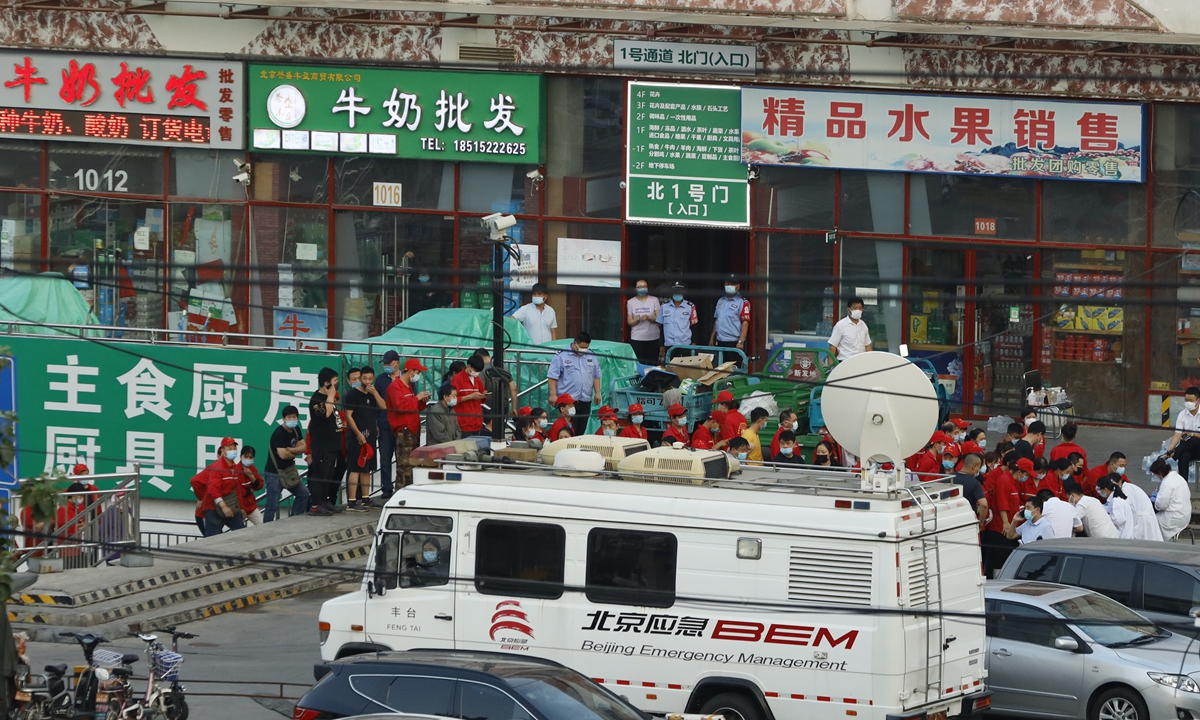
Dealers at the Xinfadi market have their information registered on Friday. Beijing authorities shut down the market after new COVID-19 cases linked the market. Photo: Li Hao/GT
A sudden spike in COVID-19 infections in Beijing linked to Asia's largest wholesale market struck a sudden blow to the capital city's seafood business, especially the salmon trade, and sounded the alarm about any lowering of the guard against the deadly disease.
The associated fears, nonetheless, have yet to feed into the economy at large, as targeted containment efforts, helped by digital payments, have so far kept the spike confined to a local area of Beijing, economic observers said Sunday, and the national economy was likely to return to growth for the whole of 2020.
Beijing reported its first domestic case in two months on Thursday. The city added six cases on Friday and another 36 on Saturday, all domestically transmitted, according to the Beijing Center for Diseases Prevention and Control.
The latest coronavirus outbreak was reportedly detected on a chopping board for imported salmon at Xinfadi wholesale market in southwest Beijing's Fengtai district, the largest of its kind in Asia.
Major supermarkets and Japanese restaurants in Beijing reportedly removed salmon from their shelves after the news emerged. A random search for salmon in Beijing on Ele.me and Meituan, the two largest food delivery apps in the country, revealed no results Sunday.
Describing the latest outbreak as an unexpected incident, a shop assistant of a seafood and sushi bar in a shopping mall in Chaoyang district said Sunday that fresh salmon products had been taken off the shelves, although baked salmon sushi made from fish previously imported from Denmark was available.
The baked items remained unsold as consumers are concerned about salmon spreading the disease, the shop assistant said, adding that the bar was likely to dispose of its salmon stocks and its salmon-linked business would take a hit from the latest outbreak.
With the source of the virus still uncertain at this time, Japanese food restaurants and seafood-themed restaurants would take the brunt of the new outbreak, said Zhao Jingqiao, executive director of the research center for services economy and catering sector under the Chinese Academy of Social Sciences.
Expecting both consumer confidence and seafood supplies to be hammered by the outbreak, Zhao told the Global Times on Sunday that an alarm has been sounded for food ingredient tracking and tracing in the catering sector in cities other than Beijing, which had only seen early signs of revival.
Other than catering business, the city's tourism and entertainment activities have been affected too, with some parks and scenic attractions in Fengtai district announcing a temporary shutdown for an unknown period of time. Indoor premises such as sports, fitness and entertainment facilities in neighboring Shijingshan district also said they would suspend operations for an unknown period.
Another sign of how the outbreak could impact the city's business reopening was a decision by an internet company based in Haidian district, which ordered all of its employees to work from home for the week beginning June 15.
Still, the city's swift yet targeted response to handling the new outbreak justifies the belief that it's unlikely there will be a nationwide resurgence of the disease to the extent that would shut down the national economy, experts said.
In the words of Zhao, the city's timely response to the outbreak, if proven effective in containing a spike, would mean the outbreak would only partially hit the consumer sector.
Other than its fallout centered on catering activity, the latest renewal won't turn into a nationwide panic, Lu Zhengwei, chief economist at Industrial Ban, told the Global Times Sunday.
The district-based containment measures would have a limited impact on flows of people and logistics, Lu said, noting that digital payments, among other technology-powered means, play a big part in tracking and pinpointing suspected infections.
Retaining optimism about a gradual economic revival, the bank economist predicted that the Chinese economy would expand by 2.9 percent in the second quarter. For the full year, the economy is estimated to grow by 3-4 percent.
The economy posted a contraction of 6.8 percent in the first quarter, official data showed.
The National Bureau of Statistics was scheduled to hold a physical press conference Monday to announce major economic indicators for May. The bureau announced Sunday it would hold a virtual event instead, citing COVID-19 outbreak containment requirements.



